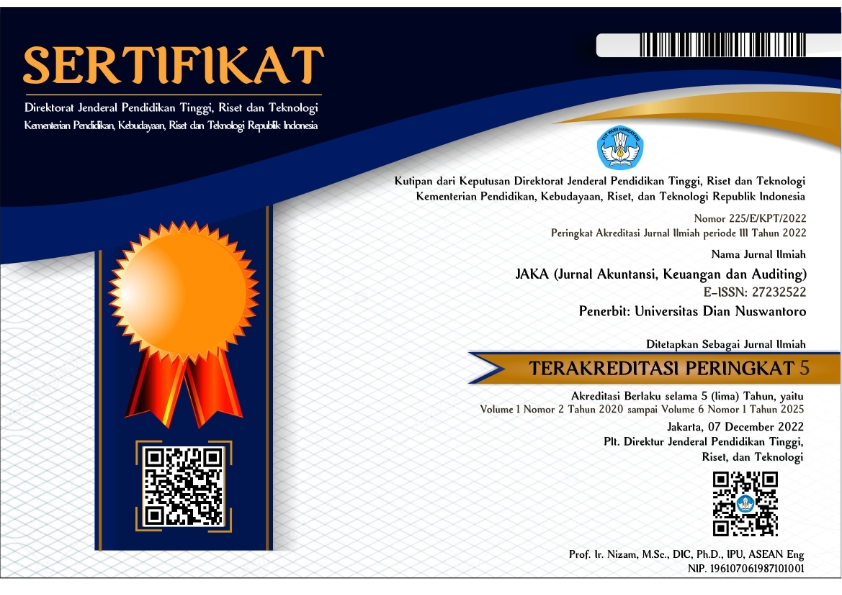Optimalisasi Manajerial Pengelolaan Dana Bantuan Sosial Selama Pandemi Covid 19 Didesa Sumberejo Mranggen Kabupaten Demak
DOI:
https://doi.org/10.56696/jaka.v5i1.10770Abstract
The Sumberejo Village Office is tasked with carrying out government, development and community affairs, as well as carrying out public services in the field of Population Administration based on Demak Regency Regional Regulation Number 10 of 2014, one of which is serving community administration. During the PPKM period there were various obstacles in determining the target strategy for targeting poor people who would be given social assistance, so far the process of collecting data on poor families is currently carried out by each RT manually on writing paper, to then be given to Village staff, there are obstacles in processes related to the length of time each RT provides data information and preparing data recapitulation reports. Apart from that, there are other obstacles related to the process of determining the provision of poor funds because there is no simulation of the calculation method. By supporting decisions to provide funds for underprivileged communities using the Analytical Hierarchy Process (AHP) method which can later support determining assistance for the community. The criteria used in providing PKH funds are education, employment, income, status, age, residence, health and number of children.References
ABBAS, A. (2017). Ekonomi Islam Dan Pemberdayaan Ekonomi Rakyat. Dialog, 32(1), 117–131. https://doi.org/10.47655/dialog.v32i1.132
Aziz, N. L. L. (2016). Otonomi Desa dan Efektivitas Dana Desa. Jurnal Penelitian Politik, 13(2), 193–211. https://doi.org/10.14203/JPP.V13I2.575
Erawati, T., & Parera, A. M. W. (2017). Pengaruh Kesadaran Wajib Pajak, Sanksi Perpajakan, Pengetahuan Perpajakan, Dan Pelayanan Fiskus. Jurnal Akuntansi, 5(1), 37. https://doi.org/10.24964/ja.v5i1.255
Hulu, Y., Harahap, R. H., & Nasutian, M. A. (2018). Pengelolaan Dana Desa dalam Pemberdayaan Masyarakat Desa. Jupiis: Jurnal Pendidikan Ilmu-Ilmu Sosial, 10(1), 146. https://doi.org/10.24114/jupiis.v10i1.9974
Informatika, I. J. (2020). INFOTECH: Jurnal Informatika & Teknologi. 1, 43–55.
Mada, S., Kalangi, L., & Gamaliel, H. (2017). Pengaruh Kompetensi Aparat Pengelola Dana Desa, Komitmen Organisasi Pemerintah Desa, dan Partisipasi Masyarakat Terhadap Akuntabilitas Pengelolaan Dana Desa Di Kabupaten Gorontalo. Jurnal Riset Akuntansi Dan Auditing “Goodwill,” 8(2), 106–115. https://doi.org/10.35800/jjs.v8i2.17199
Moonti, R. M., & Kadir, Y. (2018). Pencegahan Korupsi Dalam Pengelolaan Dana Desa. Jurnal IUS Kajian Hukum Dan Keadilan, 6(3), 430. https://doi.org/10.29303/ius.v6i3.583
Nafiah, Z. ., & Warno, W. . (2018). Pengaruh Sanksi Pajak, Kesadaran Wajib Pajak, Dan Kualitas Pelayanan Pajak Terhadap Kepatuhan Wajib Pajak Dalam Membayar Pajak Bumi Dan Bangunan (Study Kasus Pada Kecamatan Candisari Kota Semarang Tahun 2016). Jurnal Stie Semarang, 10(1), 86–105. https://doi.org/10.33747/stiesmg.v10i1.88
Subroto, A. (2009). Akuntabilitas Pengelolaan Dana Desa ( Studi Kasus Pengelolaan Alokasi Dana Desa Di Desa-Desa Dalam Wilayah Kecamatan Tlogomulyo Kabupaten Temanggung Tahun 2008). Program Studi Magister Sains Akuntansi Program Pasca Sarjana Universitas Diponegoro Semarang, 1–109.
Wida, S. A., Supatmoko, D., & Kurrohman, T. (2017). Akuntabilitas Pengelolaan Alokasi Dana Desa ( ADD ) di Desa – Desa Kecamatan Rogojampi Kabupaten Banyuwangi (The Accountability in the Management of the Village Fund Allocation in Villages at Rogojampi District , Banyuwangi Regency). E-Journal Ekonomi Bisnis Dan Akuntansi, IV(2), 148–152.
Downloads
Published
How to Cite
Issue
Section
License
Copyright (c) 2024 JAKA (Jurnal Akuntansi, Keuangan, dan Auditing)

This work is licensed under a Creative Commons Attribution-ShareAlike 4.0 International License.













